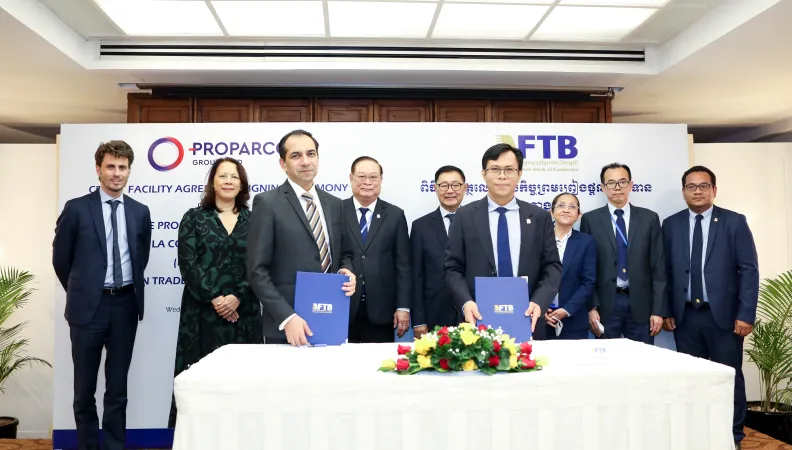Share the page
Proparco and the Foreign Trade Bank of Cambodia join forces to improve access to water and electricity for more than 500,000 people
Published on

In Cambodia, Proparco is collaborating with the Foreign Trade Bank of Cambodia (FTB), a long-standing partner of AFD Group, by signing a $20 million line of credit and a €1.5 million technical assistance grant. The project aims to improve access to essential water and electricity services for Cambodian households in peri-urban and rural areas.
The Royal Government of Cambodia (RGC) has an objective to have 100% of the country-wide households connected to clean water and reliable electricity by 2025. In order to achieve this ambitious objective, there are dependencies on a multitude of private operators to provide access of such essential services to the population in peri-urban and rural areas.
While the water sector in major cities is operated by public companies, small private operators, the "Small Water Enterprises" (SWEs), are responsible for water distribution in the rest of the country. Each SWE produces and distributes water and covers between 500 and 20,000 households. These operators are essential, but most of the time they face various challenges and including to get access to credit. The financing needs of these small private operators are estimated at nearly $280 million for water and $132.5 million for electricity.
Support access to essential services for the population
To meet these challenges, Proparco has signed a $20 million long term financing with Foreign Trade Bank of Cambodia (FTB) together with a €1.5 million technical assistance grant from the French government. This line of credit to FTB is primarily intended to support access to financing for small water and electricity enterprises ("Small Water Enterprises, SWEs, and Rural Electrification Enterprises, REEs") located in rural and peri-urban areas of Cambodia. In total, nearly 544,000 people are expected to benefit from access to improved water and electricity services.
This project is a continuation of the first phase of AFD's project to support small-scale water and electricity operators in Cambodia between 2014 and 2019, which enabled more than 400,000 Cambodian to have an improve access to water and electricity. Overall, thanks to the 2 phases of the project, close to 1 million people will get an improved access to such basic services.
For Sochal Dith, FTB Chief Executive Officer: “FTB is pleased to partner with AFD in Phase 1 and now with Proparco in Phase 2. Through this financing project with the technical assistance to support SWEs and REEs, we will be able to make a significant positive economic, social and environmental impact. It is also expected that this Phase 2 project will contribute the government’s objective of having 100% households across the country connected to clean water and affordable electricity by 2025.”
For Sandrine Boucher, AFD Country Director for Cambodia: “AFD Group is pleased to continue its support to small-scale water and electricity producers through financing to FTB. We are looking forward to putting the Group’s synergy to work for small entrepreneurs in Cambodia. This project is a continuation of the first support provided by AFD in 2014. Now implemented by Proparco's teams, this second phase demonstrates the successful cooperation between AFD, Proparco, and FTB. AFD, as a Group, is delighted to provide an innovative tool in the private sector. Phase 1 enabled 36,000 households to be connected to a better quality water service and over 26,000 homes to electricity. Phase 2 will scale up and diversify the impacts.”
For Djalal Khimdjee, Proparco Deputy Chief Executive Officer: “Thanks to this fruitful partnership with FTB which involves various stakeholders in the water and electricity sector across Cambodia, this 20MUSD long term financing combined with a 1.5MEUR technical assistance grant, more than 500,000 people will have an improved access to clean water and electricity. By facilitating access to better quality water, the project will contribute to the reduction of the development of health diseases transmitted by water whose prevalence is expected to increase in the coming years due to climate change. This is a very nice example of how banks can finance adaptation to climate change alongside access to basic services.”
